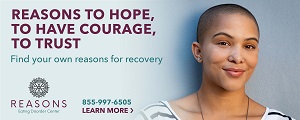- Calls to this hotline are currently being directed to Within Health, Fay or Eating Disorder Solutions
- Representatives are standing by 24/7 to help answer your questions
- All calls are confidential and HIPAA compliant
- There is no obligation or cost to call
- Eating Disorder Hope does not receive any commissions or fees dependent upon which provider you select
- Additional treatment providers are located on our directory or samhsa.gov
How to be Anti Diet: Part One – Diets, Nutrition, Food and Eating

Claire St. John, MPH, RD, CEDRD-S, Director of Operations & Research at Reasons Eating Disorder Center
With the latest diet trends constantly permeating our newsfeeds, social media, TV, advertising, books, and conversations with acquaintances and loved ones alike, how can we change the conversation so that we think about more than just our bodies or our bodies’ weights?. It’s well past time to ditch diets – as a society and as individuals. So, how can you become an advocate for change? How can you be Anti Diet?
Start with the facts
Breaking down misconceptions about the efficacy of diets starts with understanding the facts.
Did you know:
- The dieting industry is a 70-billion-dollar industry
- But, 95% of diets fail.
- In fact, most dieters will regain lost weight within one to five years.
- Furthermore, 35% of dieters progress into habitual dieting, which can be a form of disordered eating.
- Plus, as many as 25% of habitual dieters progress to developing an eating disorder.
Consider the irony of these juxtaposed truths. The diet industry is massively profitable; it is built with a full awareness of the competing fact that the vast majority of diets fail. In other words, the diet industry is an business deliberately built off of an expectation of failure. The more customers fail, the more they seek new diet solutions, funding and perpetuating the industry as a whole.
Unfortunately, this cycle has a direct, harmful impact on those who diet. Weight cycling, also known as the yo-yo effect, occurs when someone loses and regains weight over and over. From a psychological perspective, this cycle is harmful in so far as it reinforces the perception that the dieter is failing, when in fact it is the diet that is failing. But weight cycling also has direct health impacts Weight cycling can cause significant fluctuations in one’s cardiovascular health, impacting blood pressure, glucose, lipids and insulin. Weight cycling also results in muscle loss during weight loss, which is replaced with fat when weight is regained, changing the body’s composition over time.
As the facts illustrate, dieting can also put individuals on a dangerous path toward disordered eating and even full-blown eating disorders. While genetics, trauma and other factors may also contribute to the development of an eating disorder, an idealization of thinness can play a significant role. The dieting industry, as well as many social media avenues, perpetuate the “thin ideal,” with zero consideration for assessing the actual health of an individual at any size, or embracing and accepting the body as is.
Call Reasons Eating Disorder Center for Help 855-997-6505
Reframe Nutrition
Dieting and dietetics (or nutrition) don’t go hand in hand. When you ditch a diet mindset, you don’t have to ditch an interest in nutrition. The key is to reframe your perspective.
Through the process of eating disorder treatment, patients can learn to see nutrition through a lens completely separated from diets. Nutrition can be holistic, joyful, trend-free and non-restrictive.
At the most basic level, food is comprised of carbohydrates, proteins and fats. Diets are typically focused on reducing some of these macronutrients – often carbs and/or fats. But, in reality, our bodies need all three of these core macronutrients to survive. Sure, dieters might see temporary weight loss by reducing a food type – but, those results are actually due to a reduction in overall calories, not the impact of removing a certain type or category of food.
In reality, there are no good foods or bad foods. There are just foods. There is no “clean eating.” That would imply there is such a thing as “dirty eating.” Food is neutral. When we neutralize food and remove the positive and negative labels associated with different food types, we reduce internalized shame around food.
A note on special diet considerations: We embrace and celebrate special dietary considerations due to religious, ethical or medical reasons (e.g., Celiac disease, nut allergies). While we do not promote diets for the sake of “dieting,” we respect dietary constraints based on these unique considerations. In these instances, we work closely with patients to untangle eating disordered thoughts and behaviors from dietary constraints based on cultural or medical considerations.
Intuitive eating
Beyond reframing your understanding of nutrition, being anti-diet also requires reframing your perspective on eating. Consider this: eating is an activity you’ve been doing and will do for your entire life. In fact, there is no life without eating. Diet culture often encourages abstinence from certain foods or food types. But, in reality, abstinence doesn’t work when it comes to food. For those who struggle with substance abuse, abstinence is a clear and viable solution to overcoming addiction. But, food doesn’t fall within this same logic. You can live without drugs and alcohol; you can’t live without food.
Unlike struggles with substance usage, struggles with food are best addressed through exposure. In the context of disordered eating behaviors or eating disorder treatment, exposure to foods that incite fear or anxiety can be a critical step in neutralizing food and reclaiming a holistic perspective on nutrition.
As a dietitian, my goal is to support patients in cultivating an intuitive approach to eating. “Intuitive Eating: A Revolutionary Program that Works,” authored by Elyse Resch and Evelyn Tribole, distills ten key principles for taking an intuitive approach to eating:
- Reject the Diet Mentality – Need we say more?
- Honor Your Hunger – Eat when you are hungry.
- Make Peace with Food – Neutralize the “good” and “bad” concepts of food.
- Challenge the Food Police – Listen to what your body wants
- Respect Your Fullness – Listen to your body’s fullness cues, in addition to its hunger cues.
- Discover the Satisfaction Factor – Explore what it feels like to be satisfied after eating.
- Honor Your Feelings Without Using Food – Rather than relying upon food to soothe feelings, sit with and explore those feelings.
- Respect Your Body – Your body is your forever home. Treat it with care.
- Exercise — Feel the Difference – Explore what exercise feels like when it stems from a place of joyful, empowering movement.
- Honor Your Health — Gentle Nutrition – Remember that your body needs all macronutrients to thrive.
Keep in mind that, during the initial phases of eating disorder treatment, or for those who are starting treatment at a higher level of care, an eating disorder treatment team may recommend a far more structured approach to eating initially. This is an essential aspect of treatment for those who have been disconnected from their hunger and fullness cues as a result of an eating disorder. While it’s never too early to start to introduce intuitive eating pillars as a goal and a philosophy, it’s not always the starting point. Any work with a dietitian should be individualized to the patient’s needs.
Deconstructing the myths and facts about dieting, reframing nutrition, and embracing an intuitive approach to eating are key aspects of an Anti-Diet mindset. In some sense, these elements, all centered around food and nutrition, are the foundation of an Anti-Diet lifestyle. However, there is much, much more to explore. Beyond the elements surrounding food, an Anti-Diet mindset also includes sociocultural and body image considerations. In Part Two of this series, we’ll explore those elements together – stay tuned for more!

About our Sponsor
Reasons Eating Disorder Center offers a full continuum of care for patients struggling with anorexia, bulimia, binge-eating disorder, and co-occurring issues such as trauma symptoms, substance abuse, bipolar, borderline personality disorder, anxiety, obsessive-compulsive disorder, or depression.
About the Author:
Claire St. John, MPH, RD, CEDRD-S – Director of Operations & Research of Reasons Eating Disorder Center
Claire St. John brings compassion and understanding to her nutritional counseling practice. Claire has worked with men, women and children suffering from eating disorders at all levels of care, leading guided meals, restaurant and snack outings, nutrition groups and multi-family nutrition groups. With a dynamic understanding of eating disorders and how they impact individuals and families, Claire is passionate about repairing broken relationships with food.
Claire holds a Master’s of Public Health Nutrition from Loma Linda University, and after completing her rotations at Eisenhower Medical Center, became a Registered Dietitian. She is also a Certified Eating Disorder Registered Dietitian Supervisor. Working with eating disordered clients from the outset, she has developed a method of practice that includes exposure and response therapy, motivational interviewing and compassionate understanding paired with firm encouragement. Helping people reconnect with food and normalize their eating patterns is the most rewarding part of working with eating disordered patients for Claire. Encouraging people to be able to make peace with food, enjoy meals with loved ones and move through the world without fear is why Claire chose the field of eating disorders.
The opinions and views of our guest contributors are shared to provide a broad perspective of eating disorders. These are not necessarily the views of Eating Disorder Hope, but an effort to offer a discussion of various issues by different concerned individuals.
We at Eating Disorder Hope understand that eating disorders result from a combination of environmental and genetic factors. If you or a loved one are suffering from an eating disorder, please know that there is hope for you, and seek immediate professional help.
Reviewed & Approved on May 26, 2021, by Jacquelyn Ekern MS, LPC
Published May 26, 2021 on EatingDisorderHope.com

The EatingDisorderHope.com editorial team comprises experienced writers, editors, and medical reviewers specializing in eating disorders, treatment, and mental and behavioral health.



